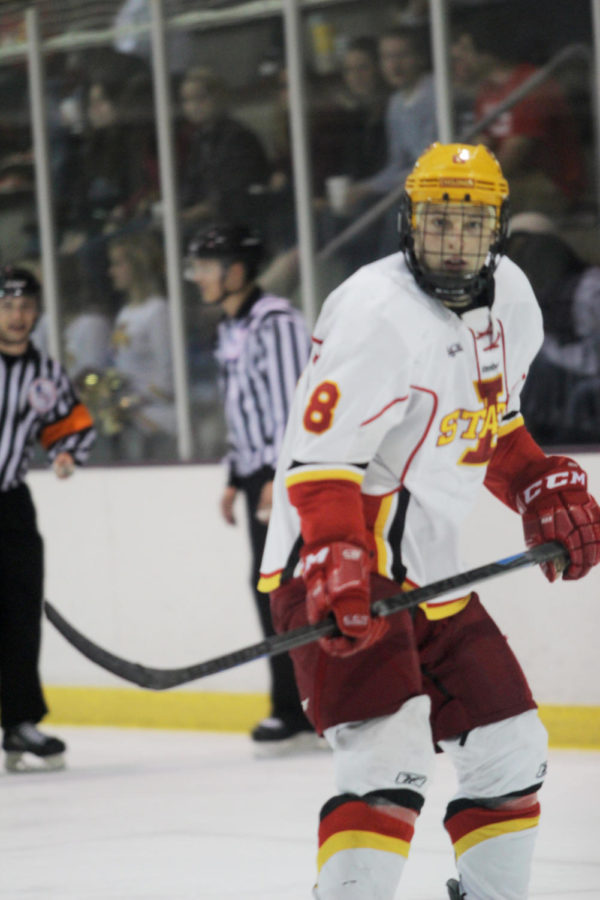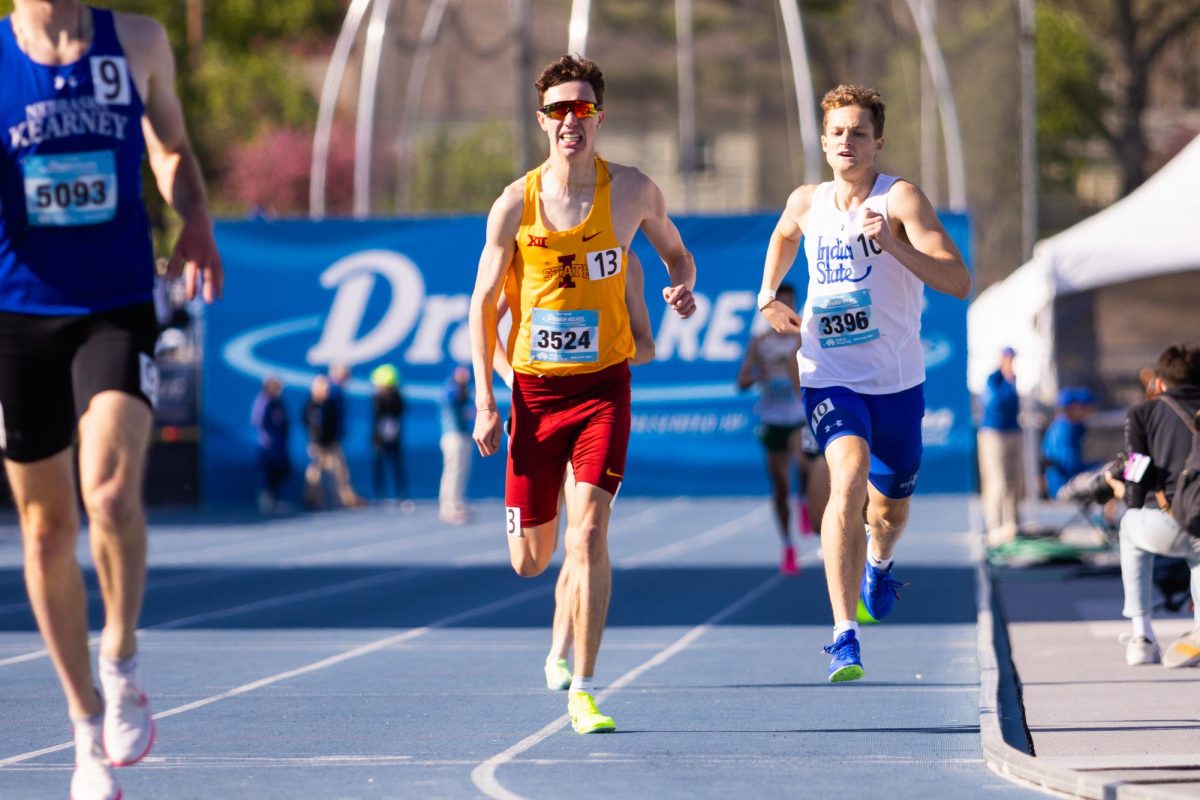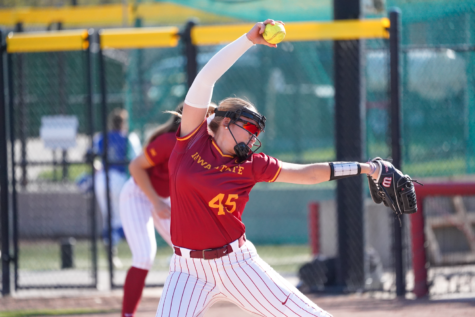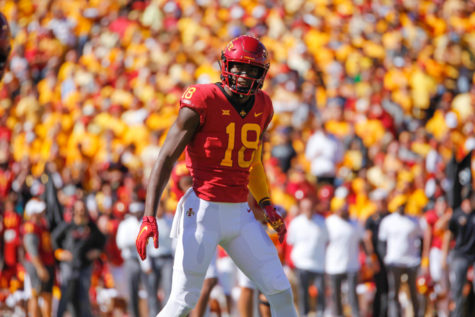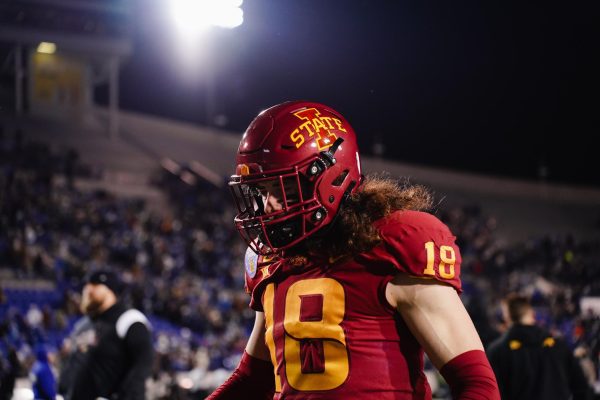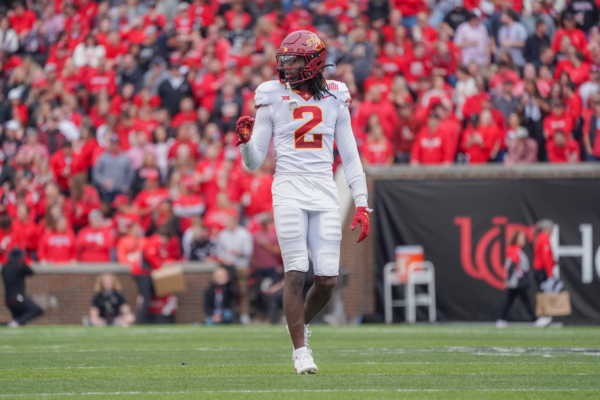Loss of vision tests freshman forward
Jessica Darland/Iowa State Daily
Freshman Zack Johnson made the first goal of the game on Sept. 26. The Cyclones beat HC Harbin, a team visiting from China, 8-0.
October 1, 2014
Freshman forward Zack Johnson has certainly faced challenges in his life, but no challenge may have been more daunting than becoming a star hockey player while missing half of his vision.
At six months of age, Johnson was diagnosed with a rare eye disease called Coats’ disease. The disease creates abnormal growth of the blood vessels behind the eye. Often times, Coats’ disease causes partial or full blindness.
In Johnson’s case, it caused him to lose his right eye.
As Johnson grew up with a prosthetic eye, he learned how to live with his affliction in day-to-day life. But when he started playing hockey, he faced another challenge — he needed to learn how to play with half the vision everyone else plays with.
Without his right eye, he had trouble seeing players coming from that side, which gave him a disadvantage when hockey became more physical. It’s a problem that he faces even today.
“I have to keep my head on a swivel that’s for sure,” Johnson said. “Sometimes it gets hard to pick up things on my right side. I definitely get blindsided sometimes, not knowing that the guy is even there.”
If Johnson had trouble seeing on his right side, it certainly didn’t show. Playing in Rochester, Minn., at John Marshall High School, Johnson started showing signs of a scoring touch. After being named team captain in his junior year, Johnson put up a team leading 25 points. He did much of the same in his senior year, scoring 16 goals and assisting on 14 en route to Big 9 All-Conference honors.
Johnson decided to take his talents to junior hockey after graduation. He first competed for the Austin Bruins, a tier II junior hockey team in the North American Hockey League. After playing in 21 games and only scoring two goals because of limited playing time, Johnson was left unsatisfied.
His departure from Austin, Minn., led him 90 miles north to the Twin Cities Northern Lights hockey team for the 2012-13 season. Johnson helped the team reach the national title with eight points in seven games, but they fell short, settling for runner-up.
Johnson took another shot at the NAHL when he joined the Coulee Region Chill but found the same problem he did with the Bruins.
“I’m really not sure why I didn’t get the playing time,” Johnson said. “I thought I was good enough and I even approached the coaches, but just wasn’t the right place, I guess.”
Johnson approached the Wisconsin Whalers, a tier III junior team in the North American tier III Hockey League, for an opportunity to play. The Whalers took him on and Johnson had his most successful season yet, scoring 26 goals and assisting 45 in all 39 games.
“Zack has a knack to put the puck in the net,” said Wisconsin Whalers head coach Tom McDermott. “He has the talent that you only see once in a while, he is very skilled. He does all of the little things right and has awesome vision on the ice.”
One of Johnson’s former teammates has a brother that played for the Cyclone Hockey team, which got Johnson interested. Johnson had different choices in ACHA schools he could play for, but after visiting Iowa State once, he said he fell in love with it.
He has had a successful freshman campaign through six games, leading the team in goals and total points with seven and 11, respectively. Cyclone Hockey coach Jason Fairman attributes Johnson’s success to his ability to make plays happen.
“Zack’s been learning on the job being a freshman, but he has shown some great signs and has a great work ethic,” Fairman said. “He is a bit of a catalyst, he can create things and make guys around him better.”
What comes along with only having one eye as a hockey player is the amount of work put in to improve. Johnson has been up to that task over his career and has been a leader for others around him in the process.
“The kid works extra hard because the loss of his eye,” McDermott said. “He expects everyone around him to act the same way. I can’t speak enough about his work ethic and his leadership skills.”
Johnson said that not many people know that he is missing an eye. Looking at him, one has to look pretty hard to notice that only one of his eyes is real. Even with that disadvantage, Johnson still remains modest.
“I mean, yeah, I feel separated from the players a little bit,” Johnson said. “I try not to look at it that way, I try to be like everyone else. Many consider what I have done an accomplishment, but I’m just doing what I can with my situation.”

